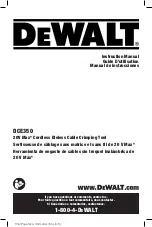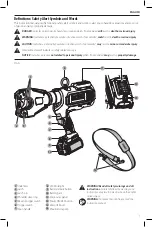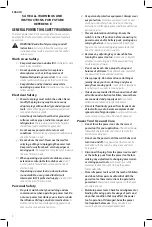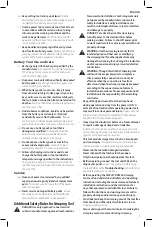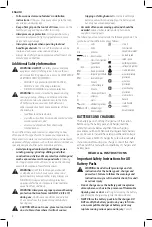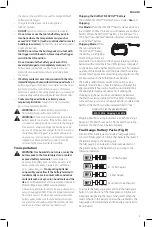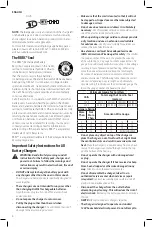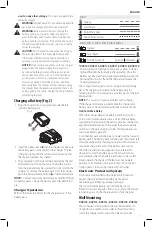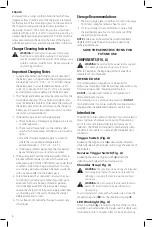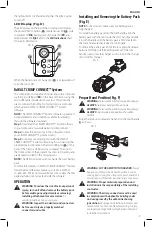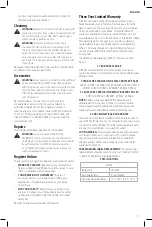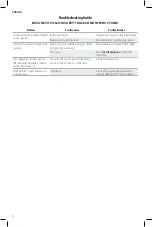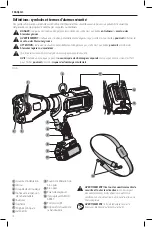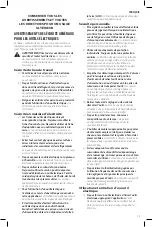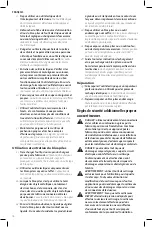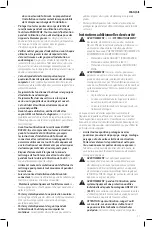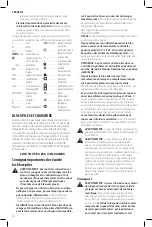
English
4
•
Follow connector manufacturer's installation
instructions.
Other uses may cause damage to the tool,
accessories, and workpiece.
•
Keep a firm grip on the tool at all times.
Forces on the
tool may change during and after the crimp.
•
Always wear eye protection.
Crimp operations may
cause material pieces to fly. Flying particles can cause
permanent eye damage.
•
Always wear gloves when operating tool and
handling materials.
The ends of the materials can be
sharp and can cause serious personal injury.
• Always wear safety shoes to protect your feet from sharp
metal debris on the floor.
Additional Safety Information
WARNING: ALWAYS
use safety glasses. Everyday
eyeglasses are NOT safety glasses. Also use face or
dust mask if cutting operation is dusty. ALWAYS WEAR
CERTIFIED SAFETY EQUIPMENT:
• ANSI Z87.1 eye protection (CAN/CSA Z94.3),
• ANSI S12.6 (S3.19) hearing protection,
• NIOSH/OSHA/MSHA respiratory protection.
WARNING:
Some dust created by power sanding,
sawing, grinding, drilling, and other construction
activities contains chemicals known to the State
of California to cause cancer, birth defects or
other reproductive harm. Some examples of these
chemicals are:
• lead from lead-based paints,
• crystalline silica from bricks and cement and other
masonry products, and
• arsenic and chromium from chemically-
treated lumber.
Your risk from these exposures varies, depending on how
often you do this type of work. To reduce your exposure to
these chemicals: work in a well ventilated area, and work with
approved safety equipment, such as those dust masks that are
specially designed to filter out microscopic particles.
•
Avoid prolonged contact with dust from power
sanding, sawing, grinding, drilling, and other
construction activities. Wear protective clothing and
wash exposed areas with soap and water.
Allowing
dust to get into your mouth, eyes, or lay on the skin may
promote absorption of harmful chemicals.
WARNING:
Use of this tool can generate and/
or disperse dust, which may cause serious and
permanent respiratory or other injury. Always use
NIOSH/OSHA approved respiratory protection
appropriate for the dust exposure. Direct particles
away from face and body.
WARNING: Always wear proper personal hearing
protection that conforms to ANSI S12.6 (S3.19)
during use.
Under some conditions and duration
of use, noise from this product may contribute to
hearing loss.
CAUTION: When not in use, place tool on its side
on a stable surface where it will not cause a
tripping or falling hazard.
Some tools with large
battery packs will stand upright on the battery pack
but may be easily knocked over.
•
Air vents often cover moving parts and should be
avoided.
Loose clothes, jewelry or long hair can be
caught in moving parts.
The label on your tool may include the following symbols. The
symbols and their definitions are as follows:
V ......................... volts
Hz .......................hertz
min .....................minutes
or DC ......direct current
...................... Class I Construction
(grounded)
…/min ..............per minute
BPM ....................beats per minute
IPM .....................impacts per minute
RPM .................... revolutions per
minute
sfpm ................... surface feet per
minute
SPM ....................strokes per minute
A .........................amperes
W ........................watts
or AC ...........alternating current
or AC/DC .... alternating or
direct current
...................... Class II
Construction
(double insulated)
n
o
........................no load speed
n .........................rated speed
......................earthing terminal
.....................safety alert symbol
.....................visible radiation
..................... wear respiratory
protection
..................... wear eye
protection
..................... wear hearing
protection
..................... electric shock
hazard
.....................crush hazard
..................... read all
documentation
BATTERIES AND CHARGERS
The battery pack is not fully charged out of the carton.
Before using the battery pack and charger, read the
safety instructions below and then follow charging
procedures outlined. When ordering replacement battery
packs, be sure to include the catalog number and voltage.
Your tool uses a
D
e
WALT
charger. Be sure to read all safety
instructions before using your charger. Consult the chart
at the end of this manual for compatibility of chargers and
battery packs.
READ ALL INSTRUCTIONS
Important Safety Instructions for All
Battery Packs
WARNING: Read all safety warnings and all
instructions for the battery pack, charger and
power tool. Failure to follow the warnings and
instructions may result in electric shock, fire and/
or serious injury.
•
Do not charge or use the battery pack in explosive
atmospheres, such as in the presence of flammable
liquids, gases or dust.
Inserting or removing the battery
pack from the charger may ignite the dust or fumes.
•
NEVER force the battery pack into the charger. DO
NOT modify the battery pack in any way to fit into
a non-compatible charger as battery pack may
rupture causing serious personal injury.
Consult

